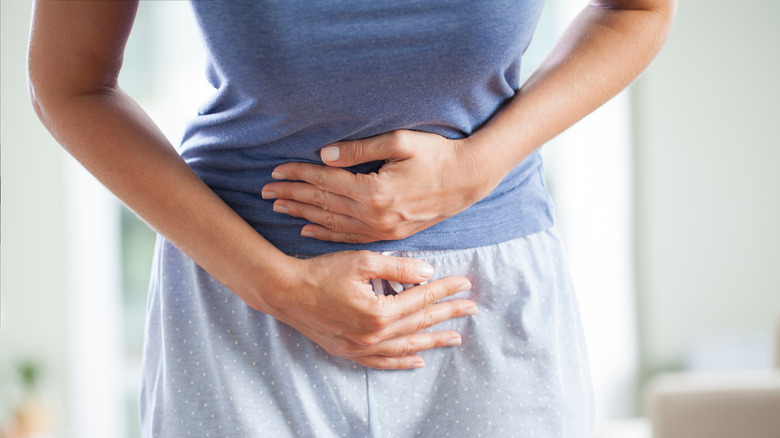This Is When You Should Be Concerned About Your Bloating
Bloating is something we're all pretty familiar with — it's uncomfortable, it's annoying, and it usually comes at the worst times. But bloating isn't always a minor inconvenience. Sometimes it's a sign that something more serious could be going on.
Bloating typically happens after eating, sometimes caused by excess gas production in the abdomen (via Healthline). It can often feel like you're overstuffed, swollen, or feeling increased pressure. It can also be caused by constipation, irritable bowel syndrome, or small intestinal bacterial overgrowth (SIBO), according to Johns Hopkins Medicine. And it's all too common — approximately 16-30 percent of people report feeling bloated regularly (via Healthline). Not only that, but 75% of people who experienced bloat reported feeling moderate to severe symptoms, according to a study published in Gastroenterology & Hepatology.
Usually bloating goes away when you move, hydrate, or just wait (via Health), but sometimes it can be accompanied by other symptoms that you shouldn't ignore.
When to talk to your doctor
If you experience bloating with any of the following symptoms, it may be a sign of a more serious medical issue. Be sure to contact your healthcare provider right away if you also experience:
-
Pain. Usually bloating is just uncomfortable, but if it feels painful, it could be a sign that something more serious is going on. Ovarian cancer can cause buildup of fluid in your abdomen, leading to bloating and pelvic pain (via Health). Pain with bloating can also be a sign of blockages in the intestines.
-
Bloating that continues for awhile. Typically bloating goes away after a short period of time, but if it continues regularly, there may be cause for concern. According to Monique Swain, M.D., obstetrician and gynecologist, bloating becomes a concern when it lasts for more than two weeks in any given month (via Health).
-
Exhaustion. If your bloating is also accompanied by extreme fatigue, it's best to see a medical provider sooner rather than later. This can be a later symptom of both liver disease and congestive heart failure, serious medical conditions.
-
Irregular bathroom habits. Another sign of ovarian cancer can be bowel and urinary issues, like needing to go to the bathroom more often than usual. This can be due to a mass pressing on your internal organs.
-
Changes in appetite. If your appetite suddenly changes, like feeling full quickly or not feeling hungry, this could be a sign of other kinds of cancers taking up space in the abdominal cavity lining, like breast cancer, colon cancer, or pancreatic cancer.


